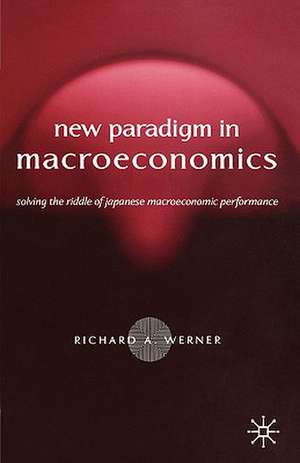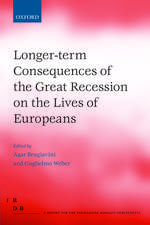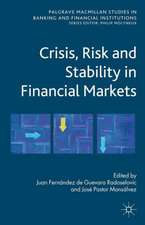New Paradigm in Macroeconomics: Solving the Riddle of Japanese Macroeconomic Performance
Autor R. Werneren Limba Engleză Paperback – 23 mar 2005
| Toate formatele și edițiile | Preț | Express |
|---|---|---|
| Paperback (1) | 874.67 lei 3-5 săpt. | +23.43 lei 4-10 zile |
| Palgrave Macmillan UK – 23 mar 2005 | 874.67 lei 3-5 săpt. | +23.43 lei 4-10 zile |
| Hardback (1) | 1006.06 lei 6-8 săpt. | |
| Palgrave Macmillan UK – 20 mar 2005 | 1006.06 lei 6-8 săpt. |
Preț: 874.67 lei
Preț vechi: 1066.67 lei
-18% Nou
Puncte Express: 1312
Preț estimativ în valută:
167.39€ • 174.11$ • 138.19£
167.39€ • 174.11$ • 138.19£
Carte disponibilă
Livrare economică 25 martie-08 aprilie
Livrare express 08-14 martie pentru 33.42 lei
Preluare comenzi: 021 569.72.76
Specificații
ISBN-13: 9781403920744
ISBN-10: 1403920745
Pagini: 423
Ilustrații: XII, 423 p.
Dimensiuni: 140 x 216 x 22 mm
Greutate: 0.53 kg
Ediția:2005
Editura: Palgrave Macmillan UK
Colecția Palgrave Macmillan
Locul publicării:London, United Kingdom
ISBN-10: 1403920745
Pagini: 423
Ilustrații: XII, 423 p.
Dimensiuni: 140 x 216 x 22 mm
Greutate: 0.53 kg
Ediția:2005
Editura: Palgrave Macmillan UK
Colecția Palgrave Macmillan
Locul publicării:London, United Kingdom
Cuprins
PART I: INTRODUCTION Prologue: Searching for a New Kind of Economics Japanese economic performance during the 1990s PART II: ENIGMAS: CHALLENGES TO THE TRADITIONAL PARADIGM The Enigma of the Ineffectiveness of Fiscal Policy The Enigma of the Ineffectiveness of Interest Rate Policy The Enigma of Japan's Long Recession The Enigma of the Ineffectiveness of Structural Policy The Enigma of Economic Growth The Enigma of the Velocity Decline The Enigma of Japanese Asset Prices The Enigma of Japanese Capital Flows in the 1980s The Enigma of Japanese Bank Lending The Enigma of Banking and its Recurring Crises PART III: EXPLANATIONS: APPLYING THE NEW PARADIGM Solving the Enigma of Banking and Money Credit, Money and the Economy Explaining the Velocity Decline The Determinants of Growth The Cause of Asset Price Bubbles and Banking Crises The Determinants of Japanese Capital Flows in the 1980s Why Fiscal Policy Could Not Work Monetary Policy in the 1990s and How to Create a Recovery Monetary Policy in the 1980s: How Bank Credit was Determined PART IV: THE GOAL OF MACROECONOMIC POLICY Banking Reform The Goal of Fiscal, Structural and Monetary Policy A New Kind of Economics A New Vision of Macroeconomic Policy
Recenzii
'Richard Werner's exploration of the reasons for Japan's long stagnation is simultaneously stimulating and controversial. His study will take the reader on an exciting and well-written detective story to discover the underlying reasons for Japan's asset boom and subsequent long-drawn-out bust. Whether readers will agree with him, or not, they will be forced, by the power of his analysis, to reconsider and to reconfigure their own preconceptions. It is both a powerful and important book, which challenges both much received wisdom and the role of the Bank of Japan.' - Charles A. E. Goodhart, Norman Sosnow Professor of Banking and Finance, London School of Economics and Political Science, University of London
'an ambitious attempt to shape the terms of the economic debate over Japan's decade-long post-bubble economic stagnation.' - William Grimes, Boston University
'What a wonderful read! It must have been exciting to solve the puzzles, and Werner does a very good job in letting the reader share in the excitement of this intellectual quest. Werner develops a simple and elegant model based on empirical observations but sufficiently abstract, and one that stands up to empirical testing impressively well. The potential implications are huge. His findings have become influential with those interested in the real world of (Japanese) finance.' - Dirk Bezemer, Imperial College, University of London
'Werner has done an excellent job of showing the difficulties and conundrums faced by neoclassical theory when confronted with Japan's recent (and older) performance. He demonstrates a scholarly and deep knowledge of the Japanese economy, while maintaining a light touch. Werner's analysis of banking and credit-money creation, in particular, offers new insights into the enigmas of Japanese capitalism. This is a book that will be read by many more than Japan specialists.' - Costas Lapavitsas, SOAS, University of London
'Lucid in presentation, trenchant in critique, Richard Werner has stamped on orthodox neo-classical interpretations of the Japanese economy and joined a group of apostates demanding a new paradigm for the dismal science. The intellectual rigour with which he marshals the evidence to explain the riddle of Japanese macroeconomic performance is impressive. Whilst his focus on the role of the Bank of Japan in the supply of money and credit as his key explanatory variable is bound to spark controversy, for all those interested in the actual workings of the Japanese economy his empirically rich and theoretically robust analysis will prove stimulating and refreshing. It should be read by all students of the Japanese economy and political economy more generally.' - Glenn D. Hook, Professor of Japanese Studies and Director of the Graduate School of East Asian Studies, University of Sheffield, UK
'Werner's exploration of the reasons for Japan's long stagnation is simultaneously stimulating and controversial. His study will take the reader on an exciting and well-written detective story to discover the underlying reasons for Japan's asset boom and subsequent long-drawn-out bust...It is both a powerful and important book, which challenges both much received wisdom and the role of the Bank of Japan.' - Charles A. E. Goodhart, London School of Economics and Political Science, UK
'an ambitious attempt to shape the terms of the economic debate over Japan's decade-long post-bubble economic stagnation.' - William Grimes, Boston University, USA
'What a wonderful read!...Werner develops a simple and elegant model based on empirical observations but sufficiently abstract, and one that stands up to empirical testing impressively well. The potential implications are huge. His findings have become influential with those interested in the real world of (Japanese) finance.' - Dirk Bezemer, Imperial College, University of London, UK
'Werner has done an excellent job of showing the difficulties and conundrums faced by neoclassical theory when confronted with Japan's recent (and older) performance...Werner's analysis of banking and credit-money creation, in particular, offers new insights into the enigmas of Japanese capitalism. This is a book that will be read by many more than Japan specialists.' - Costas Lapavitsas, SOAS, University of London, UK
'A must-read for economists and finance professionals. It will revolutionise economics.' -Tobias Hoschka, Head of Asian Research, McKinsey & Company
'an ambitious attempt to shape the terms of the economic debate over Japan's decade-long post-bubble economic stagnation.' - William Grimes, Boston University
'What a wonderful read! It must have been exciting to solve the puzzles, and Werner does a very good job in letting the reader share in the excitement of this intellectual quest. Werner develops a simple and elegant model based on empirical observations but sufficiently abstract, and one that stands up to empirical testing impressively well. The potential implications are huge. His findings have become influential with those interested in the real world of (Japanese) finance.' - Dirk Bezemer, Imperial College, University of London
'Werner has done an excellent job of showing the difficulties and conundrums faced by neoclassical theory when confronted with Japan's recent (and older) performance. He demonstrates a scholarly and deep knowledge of the Japanese economy, while maintaining a light touch. Werner's analysis of banking and credit-money creation, in particular, offers new insights into the enigmas of Japanese capitalism. This is a book that will be read by many more than Japan specialists.' - Costas Lapavitsas, SOAS, University of London
'Lucid in presentation, trenchant in critique, Richard Werner has stamped on orthodox neo-classical interpretations of the Japanese economy and joined a group of apostates demanding a new paradigm for the dismal science. The intellectual rigour with which he marshals the evidence to explain the riddle of Japanese macroeconomic performance is impressive. Whilst his focus on the role of the Bank of Japan in the supply of money and credit as his key explanatory variable is bound to spark controversy, for all those interested in the actual workings of the Japanese economy his empirically rich and theoretically robust analysis will prove stimulating and refreshing. It should be read by all students of the Japanese economy and political economy more generally.' - Glenn D. Hook, Professor of Japanese Studies and Director of the Graduate School of East Asian Studies, University of Sheffield, UK
'Werner's exploration of the reasons for Japan's long stagnation is simultaneously stimulating and controversial. His study will take the reader on an exciting and well-written detective story to discover the underlying reasons for Japan's asset boom and subsequent long-drawn-out bust...It is both a powerful and important book, which challenges both much received wisdom and the role of the Bank of Japan.' - Charles A. E. Goodhart, London School of Economics and Political Science, UK
'an ambitious attempt to shape the terms of the economic debate over Japan's decade-long post-bubble economic stagnation.' - William Grimes, Boston University, USA
'What a wonderful read!...Werner develops a simple and elegant model based on empirical observations but sufficiently abstract, and one that stands up to empirical testing impressively well. The potential implications are huge. His findings have become influential with those interested in the real world of (Japanese) finance.' - Dirk Bezemer, Imperial College, University of London, UK
'Werner has done an excellent job of showing the difficulties and conundrums faced by neoclassical theory when confronted with Japan's recent (and older) performance...Werner's analysis of banking and credit-money creation, in particular, offers new insights into the enigmas of Japanese capitalism. This is a book that will be read by many more than Japan specialists.' - Costas Lapavitsas, SOAS, University of London, UK
'A must-read for economists and finance professionals. It will revolutionise economics.' -Tobias Hoschka, Head of Asian Research, McKinsey & Company
Notă biografică
RICHARD A. WERNER is Professor of International Banking at the University of Southampton, UK. Previously, he was Reader at Southampton and Assistant Professor of Economics at Sophia University in Tokyo, Japan. He has spent over a decade in Asia, including at the Bank of Japan, the Japanese Ministry of Finance and the Asian Development Bank, and as Chief Economist of Jardine Fleming Securities (Asia) Ltd and asset allocator of a major pension fund. He is much quoted in the media and has published widely on financial markets and monetary economics. In 2003, he was selected as Global Leader for Tomorrow by the World Economic Forum in Davos.
















